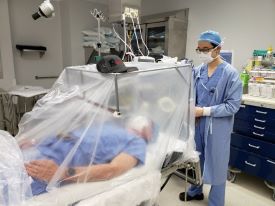As governments and health care providers around the world scrambled earlier this year to acquire personal protective equipment (PPE) and other important medical materials in the face of a growing pandemic, distribution chains were severely disrupted — impacting Canada's ability to source the needed supplies from abroad.
Dalhousie and the (HUB), located on Sexton Campus, sprung into action quickly to address the critical need for locally available solutions, tapping into extensive alumni networks to create powerful connections between top engineering experts and industry partners.
During typical times, the HUB serves as one of Nova Scotia's most vibrant product-development spaces, empowering students, faculty and alumni to come together to create advanced prototypes and make their startups investment ready. When COVID-19 arrived in Nova Scotia, though, the space — like others on campus — had to close its doors. But that didn't stop its team from stepping up to respond to the PPE and equipment needs of Atlantic Canada.
Innovation during an emergency
Within a week, Dalhousie, Nova Scotia Health (NSH), Atlantic Canada Opportunities Agency (ACOA), NSBI (Nova Scotia Business Inc), the IWK Health Centre, Enginuity Inc, and Ignite Atlantic came together. The Emergency Innovation Team was formed with the objective to identify equipment needs and anticipate potential shortages.
A sister team – the "Skunkworks" innovation team – came together to coordinate and implement local production and solutions. The designation "skunkworks" is widely used in business, engineering, and technical fields to describe a group that can move quickly, unhampered by bureaucracy, to advance the most innovative projects.
As a key member of the Emergency Innovation and Skunkworks teams, Dal and the Emera ideaHUB coordinated partnerships across the region to create solutions. Reaching into deep alumni, community, industry, and academic connections to bring the best teams together. The strategic partnerships facilitated between Dalhousie partners and provincial partners were vital in creating a rapid response across a wide area of expertise.
Key initiatives included:
- Civil & Water Engineers from Dalhousie collaborated with Nova Scotia Health and industry partner to modify units typically used in hospitals to instead be dedicated to decontaminating medical masks. The team also collaborated with industry partners and to pivot a water treatment UV solution so it could be deployed in health care.
- Mechanical & Biomedical Engineers from Dalhousie collaborated with Nova Scotia Health and industry partner to create a face shield that was designed to meet infection prevention and control standards and is manufactured in Atlantic Canada to meet demand.
- Engineers in Process Engineering & Applied Science (PEAS) quickly set up testing facilities to perform vital material research. In conjunction with the in the Faculty of Medicine, Dalhousie became the central research facility to explore local materials that could be used in the production of PPE.
- Engineers from the Department of Industrial Engineering quickly responded to create processes that could adapt to system changes due to COVID, including scheduling elective surgeries, creating responding to COVID impacts, and new distribution procedures for needed and sanitized PPE within the healthcare system in Atlantic Canada.Â
 Dal Engineering’s has been instrumental in concept designs for intubation canopies (shown right) with Nova Scotia Health and the IWK and partner Enginuity. Canopies protect health care workers while providing care for patients on ventilators.
Dal Engineering’s has been instrumental in concept designs for intubation canopies (shown right) with Nova Scotia Health and the IWK and partner Enginuity. Canopies protect health care workers while providing care for patients on ventilators.
- Electrical Engineers quickly put their expertise to use offering valuable insight into modifications and alternatives for assisted breathing devices, including ventilators which are often essential for severe cases of COVID-19.
- A team from Pathology was engaged to perform sterilization on essential swab kits used for COVID testing.
- The HUB leveraged it’s regional networking including and Dal’s Industry Liaison & Innovation Office.Collaborating with Acadia University resulted in the verification of hand sanitizer. A collaboration with Memorial University of Newfoundland increased the capability to increase testing of alternative materials for PPE.
Startup companies resident in the HUB incubator also quickly pivoted their prototypes as a response to COVID.

•   applied their breathing assist technology (shown above) for COVID patients.
•   The Founder of quickly scaled production timelines so its product emitto could be deployed to limit contact for those in care facilities.
•   leveraged their strategic partnerships, including R&D partnerships with Dalhousie’s Faculty of Agriculture, to investigate an alternative mask material, the .
From top researchers and engineers to a widespread alumni network, it is estimated that between 25 and 40 Dal alumni were engaged from different industries to help provide solutions.

